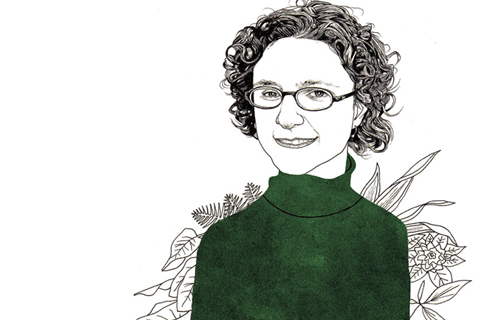Plastic is an amazing material: it is light, strong, flexible and cheap to produce. But it has two big drawbacks: it’s made from petroleum, of which we have limited supplies, and it doesn’t decompose easily. Humans throw away millions of tonnes of plastic every year. A tiny portion of it is now biodegradable, but the vast majority will sit in landfill sites for centuries.
What if we could make plastic from renewable biomaterials instead of petrochemicals? This possibility intrigues Emma Master, a professor of chemical engineering. In her lab in the Wallberg Building’s “BioZone,” she is investigating how to use plants to create new materials and chemicals.
The implications could eventually affect large segments of the economy: research by Master and others in the field could lead to new kinds of organic packaging to replace Styrofoam, plastic wrap and drink cartons – and new markets for wood and other fibres. Although her immediate goal is to create plant-based materials that behave like existing plastics, in the longer term, she hopes to design these new organic materials to respond to external stimuli. Imagine drug casings that release their active ingredient only when in the vicinity of certain types of cells, and textiles that adapt to their conditions. Master thinks that other possibilities will come to light as research progresses. “We’ll have advanced, versatile materials for beneficial uses we haven’t imagined yet,” she says.
At the same time, Master, 39, wants to ensure that the processes for making these new materials are also environmentally friendly. “Making new materials from a plant isn’t necessarily sustainable if the conversion of the plant to the product isn’t itself sustainable,” she notes.
As a graduate student, Master worked in bio-remediation, which uses biological processes to transform waste into nontoxic compounds. This experience made her wonder whether biology could one day be harnessed to prevent waste in the first place. Now, she envisions a future in which our understanding of plant polymers allows us to construct and engineer materials that propel society forward in a sustainable way. Indeed, it’s her hope that our grandchildren may one day look at all that plastic lingering in landfill sites and wonder what we found so appealing about it.
Recent Posts
U of T’s 197th Birthday Quiz
Test your knowledge of all things U of T in honour of the university’s 197th anniversary on March 15!
Are Cold Plunges Good for You?
Research suggests they are, in three ways
Work Has Changed. So Have the Qualities of Good Leadership
Rapid shifts in everything from technology to employee expectations are pressuring leaders to constantly adapt






